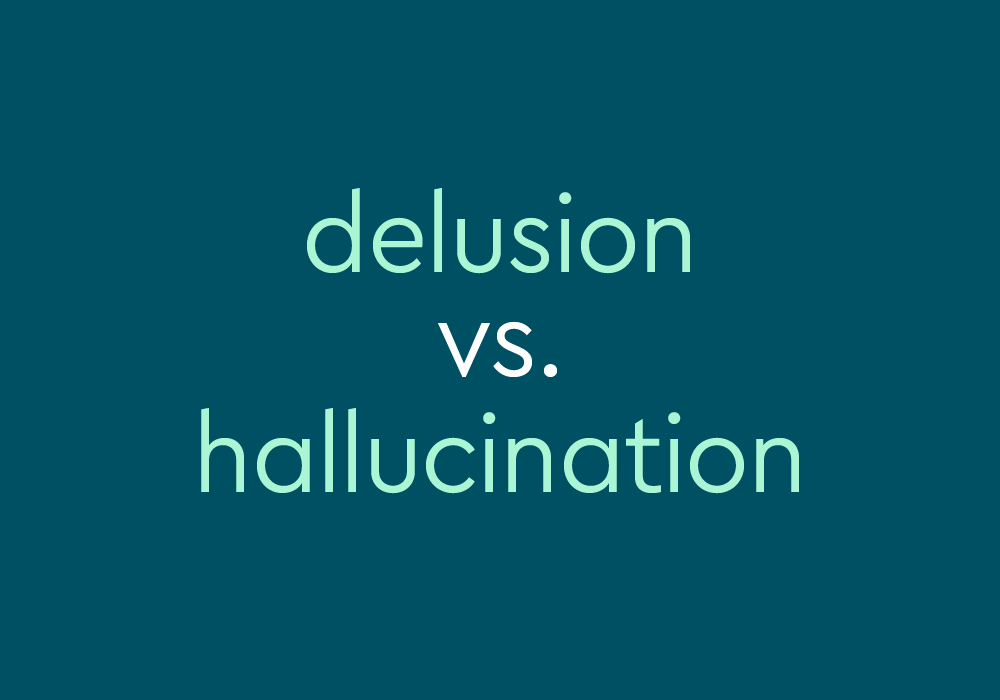Explain How Hallucinations and Delusions Are Different
Hallucinations and delusions are two of the major psychotic symptoms that are caused by schizophrenia. The contents of hallucinations are thought to reflect their psychodynamic significance.

Delusions Hallucinations Illusions And Loose Associations Psychiatry Medbullets Step 1
With medication and therapy an.

. The following sentences are examples of how hallucination and delusion are commonly used and illustrate their differences. A delusion unlike an overvalued idea is not understandable in terms of the patients cultural and educational background although the secondary delusion or delusion-like idea is understandable with the addition of some other psychopathological event such as hallucination or abnormal mood. The key difference is the presence of a stimulus which only exists in the latter.
The standard preoccupation remains whether any belief is delusional or. They are often a part of post traumatic stress disorder PTSD and are also common for those who have suffered childhood abuse. Examples of hallucination and delusion used in a sentence.
Hallucinations are mainly connected to a persons senses so they may hear see smell or feel something thats not really there. Mood-congruent delusions are consistent with a depressive or manic state such as. Like other hallucinations olfactory and taste hallucinations can be troubling to the person experiencing them especially if they overlap with delusions.
Four types of delusions outlined in the DSM-5 include. Non-bizarre delusions could actually occur in reality such as being cheated on poisoned or stalked by an ex. With bipolar I disorder hallucinations are possible both with mania and depression.
Maybe youve misunderstood people and they arent actually hallucinating or being delusional. Hallucinations indicate more of a sensory experience and delusions are a false belief. Mental health issues linked to flashbacks hallucinations and delusions.
This article describes 1. For example a delusion may be a belief that the government is controlled by reptilian men who are poisoning the water supply to enslave the masses. The difference between delusions and hallucinations is that whilst hallucinations are sensations that are not real such as hearing voices or seeing things which are not there delusions are the strong beliefs that cannot be true.
Whereas an illusion is merely a misperception which is often used in magic tricks. The following section gives you in-depth descriptions of each psychotic symptom as well as some real-life examples of each. Experts explain the nuances between hallucination illusions and delusions and what it means for someone with Parkinsons.
Hallucinations and delusions are more likely to occur in advanced Parkinsons. One of my in-laws has been diagnosed with dementia and they really have to kinda watch him especially after that one night the police brought him home stark naked. Taking a hallucinogenic drug like LSD often results in hallucinations.
One difference is that a person experiencing a hallucination may realize it is not truefor instance when a migraine causes an aura or lines in the vision. Despite being different they are both part of experiencing a false reality. Understanding the different types of hallucinations and delusions can help you better recognize them.
As mentioned before hallucinations and delusions are the hallmark symptoms of psychosis. Hallucinations and delusions are two symptoms of Parkinsons. Hallucinations often occurring with delusions during psychotic states may represent the concrete symbolic expression of delusional ideas that are seeking other routes of expression.
Hallucinations refer to a break from reality that affects your senses and perceptions while delusions affect your thoughts and beliefs. There are ways to help treat and manage hallucinations and delusions. They are experiences that seem real to the observer but are not real.
For example in a person who has a delusion that he is being poisoned a taste hallucination would be extremely distressing. Experts explain the nuances between these symptoms of psychosis and. While delusional thoughts can often involve things that feel real but arent they are not the same as a hallucination.
What is Delusion Definition Meaning Causes Symptoms Treatment Methods. In bipolar II hallucinations may occur only during the depressive phase. While hallucinations are based in the senses delusions revolve around concepts ideas and beliefs that are strongly held in the mind.
Visual and auditory hallucinations are a common symptom of some forms of psychosis. Hallucination may also occur when under the influence of drugs or alcohol. Bizarre delusions are implausible or impossible such as being abducted by aliens.
Answer 1 of 4. A hallucination is an error in perception that is why it is often associated with mental health issues. Someone who is delusional will believe in the delusion very firmly even when shown evidence to the contrary.
Hallucinations dont necessarily indicate schizophrenia. Flashbacks are based on real trauma. Bipolar hallucinations involve the senses.
People with mood disorders schizoaffective disorders and other physical and mental health conditions may also hallucinate. Delusions are erroneous beliefs and hallucinations are perceptions of stimuli that dont actually exist. Hallucinations and delusions are relatively common among people with Parkinsons disease.
Bipolar disorder that presents with hallucinations andor delusions can also lead to a diagnosis of bipolar disorder with psychotic features. Hallucinations and delusions are also often experienced together both being main symptoms of psychosis. They are often experienced together but they do refer to different symptoms.
The main difference between delusion and hallucination is that delusion is a fixed yet false belief which is often fanciful and derived by deception whereas hallucination is a faulty perception in the absence of any external stimulus. Delusions are defined as beliefs that conflict with reality. Both hallucinations and delusions are disturbances in reality.
Muskin a psychiatrist at New York-Presbyterian. Bipolar delusions are about unshakable feelings and beliefs. The person might perceive it as proof that the delusion is true.
This is another common misconception in the delusions vs hallucinations conversation.
Difference Between Hallucinations And Illusions Difference Between
What Does Delusional Mean Discount 58 Off Www Pegasusaerogroup Com

Delusion Vs Hallucination What S The Difference Dictionary Com
No comments for "Explain How Hallucinations and Delusions Are Different"
Post a Comment